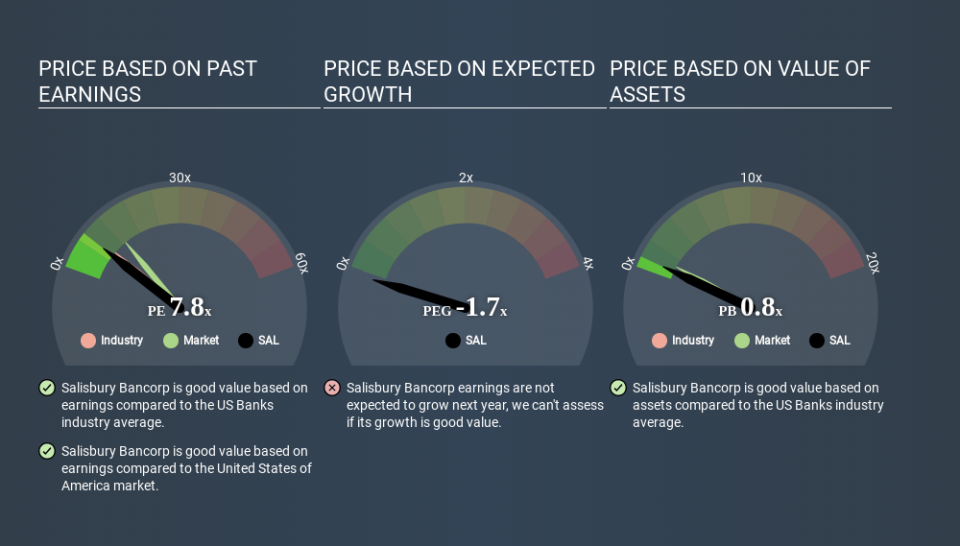What Is Salisbury Bancorp's (NASDAQ:SAL) P/E Ratio After Its Share Price Tanked?

To the annoyance of some shareholders, Salisbury Bancorp (NASDAQ:SAL) shares are down a considerable 31% in the last month. The recent drop has obliterated the annual return, with the share price now down 24% over that longer period.
Assuming nothing else has changed, a lower share price makes a stock more attractive to potential buyers. While the market sentiment towards a stock is very changeable, in the long run, the share price will tend to move in the same direction as earnings per share. The implication here is that long term investors have an opportunity when expectations of a company are too low. Perhaps the simplest way to get a read on investors' expectations of a business is to look at its Price to Earnings Ratio (PE Ratio). A high P/E implies that investors have high expectations of what a company can achieve compared to a company with a low P/E ratio.
See our latest analysis for Salisbury Bancorp
How Does Salisbury Bancorp's P/E Ratio Compare To Its Peers?
We can tell from its P/E ratio of 7.76 that sentiment around Salisbury Bancorp isn't particularly high. We can see in the image below that the average P/E (8.9) for companies in the banks industry is higher than Salisbury Bancorp's P/E.
This suggests that market participants think Salisbury Bancorp will underperform other companies in its industry. While current expectations are low, the stock could be undervalued if the situation is better than the market assumes. It is arguably worth checking if insiders are buying shares, because that might imply they believe the stock is undervalued.
How Growth Rates Impact P/E Ratios
Earnings growth rates have a big influence on P/E ratios. When earnings grow, the 'E' increases, over time. That means even if the current P/E is high, it will reduce over time if the share price stays flat. So while a stock may look expensive based on past earnings, it could be cheap based on future earnings.
It's nice to see that Salisbury Bancorp grew EPS by a stonking 25% in the last year. And earnings per share have improved by 24% annually, over the last five years. I'd therefore be a little surprised if its P/E ratio was not relatively high.
A Limitation: P/E Ratios Ignore Debt and Cash In The Bank
One drawback of using a P/E ratio is that it considers market capitalization, but not the balance sheet. Thus, the metric does not reflect cash or debt held by the company. Hypothetically, a company could reduce its future P/E ratio by spending its cash (or taking on debt) to achieve higher earnings.
While growth expenditure doesn't always pay off, the point is that it is a good option to have; but one that the P/E ratio ignores.
How Does Salisbury Bancorp's Debt Impact Its P/E Ratio?
Salisbury Bancorp has net debt equal to 48% of its market cap. You'd want to be aware of this fact, but it doesn't bother us.
The Bottom Line On Salisbury Bancorp's P/E Ratio
Salisbury Bancorp's P/E is 7.8 which is below average (13.1) in the US market. The company hasn't stretched its balance sheet, and earnings growth was good last year. If the company can continue to grow earnings, then the current P/E may be unjustifiably low. What can be absolutely certain is that the market has become more pessimistic about Salisbury Bancorp over the last month, with the P/E ratio falling from 11.3 back then to 7.8 today. For those who prefer invest in growth, this stock apparently offers limited promise, but the deep value investors may find the pessimism around this stock enticing.
Investors have an opportunity when market expectations about a stock are wrong. As value investor Benjamin Graham famously said, 'In the short run, the market is a voting machine but in the long run, it is a weighing machine. So this free visualization of the analyst consensus on future earnings could help you make the right decision about whether to buy, sell, or hold.
Of course you might be able to find a better stock than Salisbury Bancorp. So you may wish to see this free collection of other companies that have grown earnings strongly.
If you spot an error that warrants correction, please contact the editor at editorial-team@simplywallst.com. This article by Simply Wall St is general in nature. It does not constitute a recommendation to buy or sell any stock, and does not take account of your objectives, or your financial situation. Simply Wall St has no position in the stocks mentioned.
We aim to bring you long-term focused research analysis driven by fundamental data. Note that our analysis may not factor in the latest price-sensitive company announcements or qualitative material. Thank you for reading.

 Yahoo News
Yahoo News 

